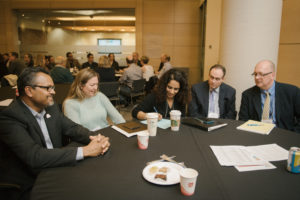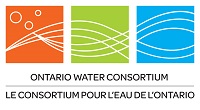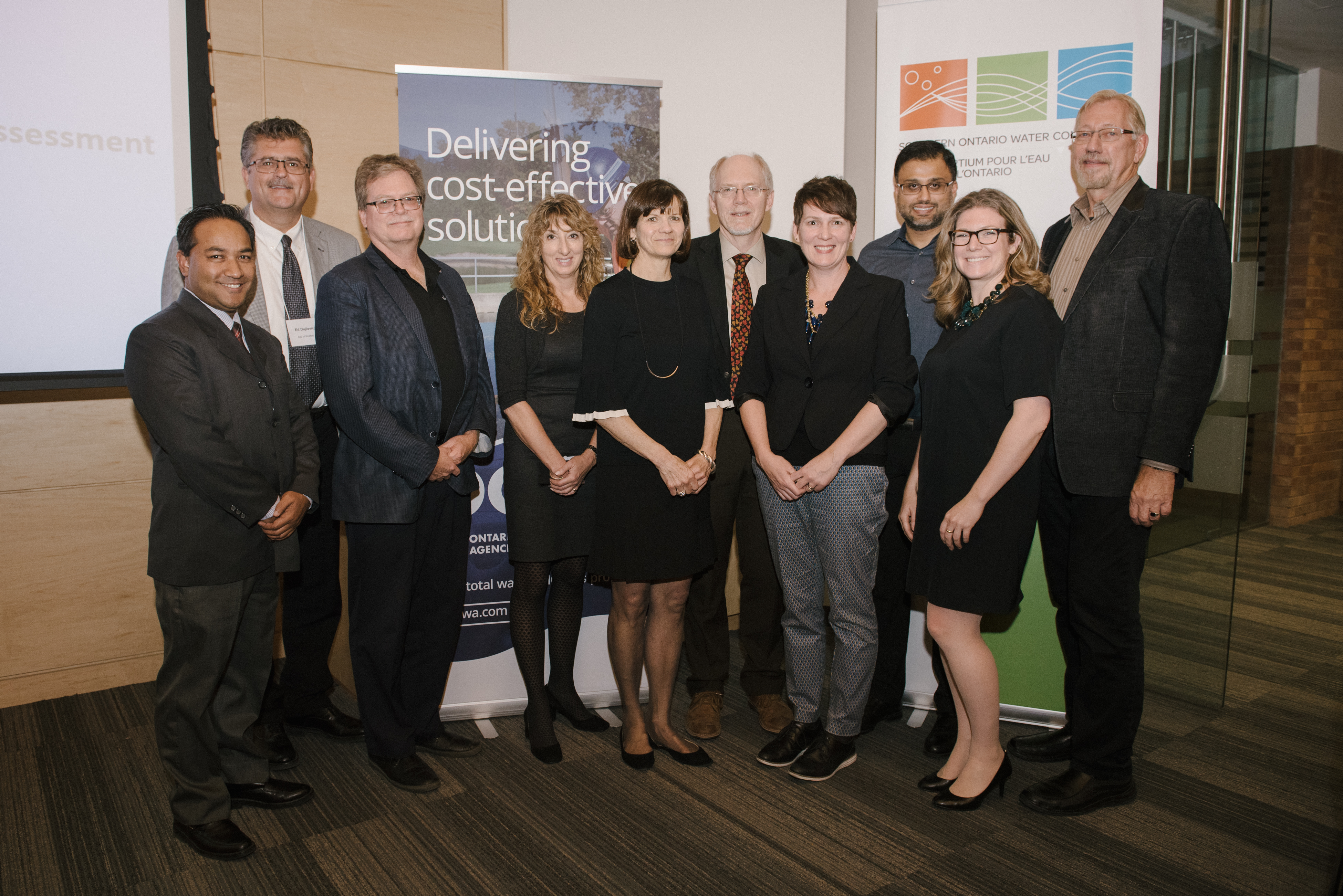Can we create 5 “net zero energy” wastewater facilities in Ontario in the next 5 years?
It certainly felt possible on October 30, 2017 when SOWC and OCWA convened a workshop with municipal leaders, water technology companies and academic experts. They came together to talk about how to make such a radical transition in Ontario.
We’re off to a pretty good start! City of Stratford was an important case study for the day’s discussion, profiling its plans to advance a Net Zero Energy facility that will accept source separated organics for processing along with biosolids in the anaerobic digester at its wastewater treatment plant. The proposed project was made possible through the City’s collaboration with OCWA and the incorporation of state-of-the-art technology for Biological Hydrolysis (BH) by Suez Water (formerly GE Water & Process Technologies). It’s an example of the “innovation ecosystem” working in Ontario: Building on Suez’ Advancing Water Technologies project, SOWC facilitated an introduction to OCWA. OCWA not only introduced Stratford as a suitable municipal partner for a project, but came on board as a partner in the project.
To accomplish Net Zero Energy, the energy produced has to balance the energy consumed in the wastewater treatment process. Net Zero Energy can be achieved in two ways: minimizing energy consumption in operations, and by capturing biogas and converting it to RNG. For example, in Hamilton, Ontario, RNG was converted into compressed natural gas for vehicle fuels, contributing to the energy neutrality of the facility.
The above demonstrates how reduction of energy consumption and optimization of energy production can lead to cost savings and opportunities to utilize innovative technology. A number of Ontario technology companies are actively developing solutions in the areas of enhanced digestion, plant modelling and optimization control systems. A dozen such companies participated in the Net Zero event.
Clearly, Net Zero Energy projects are becoming more feasible and cost effective. And, as SOWC Executive Director Brenda Lucas explained, the provincial policy and funding context is very promising with a regulation pending for asset management planning, a framework emerging for organics management, and new funding programs for innovative technologies and municipal infrastructure projects [see Stars are Aligning article].
As Wayne Parker, professor in Civil Engineering at University of Waterloo, discussed there is still work to do. There are many drivers influencing municipal wastewater infrastructure decisions. There is tremendous opportunity to incorporate accepted stabilization, thickening and dewatering practices and technologies that will reduce energy demand – as well as many emerging technologies to help municipalities deal with the drivers and recover resources from biosolids. But we need better data, particularly centralized data about current practices for biosolids disposition in Ontario and more comprehensive information about the applicability of various technologies to municipal systems.
There are remaining challenges to be overcome for the Stratford project, as the City’s Director of Infrastructure and Development Ed Dujlovic outlined. This includes confirming the details of the partnership among the City, OCWA, Suez and Union Gas, securing the long-term supply of source separated organics required to make the project economically feasible in the long term, and obtaining appropriate regulatory approval for the project to proceed.
These were among the issues that the participants tackled together over the course of the afternoon. Four key challenges were identified for discussion, and each was introduced with brief remarks by an expert catalyst.
Challenge #1: Integrated Planning
Rick Kester, CAO, City of Belleville talked about how his community successfully integrated its services department: water, wastewater, brownfields and solid waste together. It also established a “green committee” to advocate and engage elected officials.
Challenge #2: Data
The groups tackled the challenge of data availability. What data exists and what data is needed to support the local and regional considerations that are needed to make this a viable and understood opportunity? Don Hoekstra, Director of Innovation, Technology, and Alternative Delivery, OCWA noted that municipalities need a strategy and a clear set of values to inform what data they need. Then, with a clear sense of what questions they need to answer, municipalities need to take a hard look at the data they have available (keeping in mind that it was probably generated for a different purpose).
Challenge #3: Regional Approaches
Phil Sidhwa, President & CEO, Orgatec Energy, Inc. encouraged municipalities to take a hard look at whether there will be sufficient waste material to supply projects, particularly for small- and medium-sized municipalities. Regional approaches are necessary, but complicated. Phil noted that not only availability but also transportation distances (and costs) need to be taken into account. He emphasized the importance of starting with a good optimization study, to get the most out of current capacity and make sure there is adequate capacity that won’t compromise operations. Additionally, he reminded municipalities that the location for pre-processing facilities (at WWTP or a transfer station) is another important consideration.
Challenge #4: Approvals, Environmental Assessment and Regulations
Barb McMurray, Project Manager, Environmental Innovations Branch, Ministry of the Environment and Climate Change set up the discussion about regulatory approvals and environmental assessment requirements, and spoke to recent improvements and uncertainties. Barb discussed some of the improvements the MOECC has made that will help facilitate expediting regulatory approvals. This includes prioritization for innovative projects and the new MOECC commitment to a 12-month service standard. Barb acknowledged that uncertainties do remain, for example determining whether a particular project requires a Renewable Energy Approval (REA) and/or a Class EA. Barb noted that MOECC continues to prioritize review of Environmental Compliance Approvals for “innovative initiatives.”

Copryright: SOWC
After tackling the 4 key questions, participants got into the details with separate regional discussions. They each talked about what it might take to accelerate progress toward net zero energy wastewater treatment plants. Common factors described included: funding, champions (both municipal political champions and support from enabling organizations like OCWA and SOWC), provincial leadership for coordination and integration of planning efforts (to avoid competition for organics), acceptance of innovation in approvals, communication and information sharing, and data to support the business case.
Everyone recognized there is a tremendous opportunity. Participating municipalities were enthusiastic about net zero projects materializing, it’s just a question of when. And while full “net zero energy” won’t be feasible in all municipalities, moving towards net zero – driving efficiencies in energy consumption and diverse options for energy capture and reuse – will be universally beneficial. There’s a lot more to do and OCWA and SOWC committed their leadership in facilitating and supporting moving this forward.
We thank everyone for their participation and enthusiastic engagement!
Getting to Net Zero II Workshop Outcomes
Powerpoint Presentations:
Brenda Lucas
Ed Dujlovic
Wayne Parker
The following technology companies participated in the event and provided these short summaries of their relevant technologies:
Anaergia
ElectroKinetic Solutions
ETO Engineering
Hydromantis Environmental Software Solutions
InCtrl Solutions
Renix
SUEZ Water Technologies & Solutions
SusGlobal Energy
Trojan Technologies
Walker Environmental


